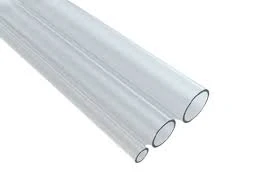Nov . 06, 2024 15:58 Back to list
Using PVC Pipe for Efficient Drip Irrigation Systems in Gardening and Agriculture
The Role of PVC Pipe in Drip Irrigation
Drip irrigation has revolutionized the way we approach agricultural water management. This efficient method allows water to drip slowly to the roots of plants, minimizing water waste and enhancing crop yield. One of the key components enabling this precise irrigation technique is the use of PVC (polyvinyl chloride) pipes. These pipes have gained popularity in the agricultural sector for several reasons, particularly their durability, cost-effectiveness, and ease of installation.
Advantages of Using PVC Pipes in Drip Irrigation
PVC pipes are renowned for their longevity and resistance to corrosion, making them an ideal choice for outdoor agricultural applications. Unlike metal pipes, which can rust or corrode over time when exposed to water and soil, PVC pipes maintain their structural integrity, reducing the need for frequent replacements. This durability translates to savings over the long run, as farmers can invest in a single installation that lasts many seasons.
Another advantage of PVC pipes is their versatility. Available in various sizes and configurations, they can easily be adapted to fit different irrigation setups. Whether dealing with small gardens, large fields, or commercial orchards, PVC pipes can be tailored to meet specific watering needs. This customizability ensures that every plant receives the appropriate amount of water, which is crucial for maximizing growth and productivity.
Moreover, the lightweight nature of PVC pipes simplifies installation. Farmers can transport, handle, and install these pipes with relative ease compared to heavier materials. This attribute is especially beneficial for large agricultural projects where time and labor costs can be significant. Additionally, the smooth interior surface of PVC pipes minimizes friction, allowing water to flow freely and efficiently, further enhancing the effectiveness of the drip irrigation system.
Environmental Impact and Water Conservation
pvc pipe to drip irrigation

The environmental advantages of drip irrigation, bolstered by the use of PVC pipes, cannot be overlooked. With traditional irrigation methods, a significant amount of water is lost due to evaporation and runoff. In contrast, drip irrigation delivers water directly to the plant roots, significantly reducing wastage. Studies show that this method can save up to 60% more water compared to conventional practices.
Employing PVC pipes in drip irrigation also allows for the potential incorporation of water recycling measures. Many farms implement systems that capture rainwater or reclaim runoff for use in their irrigation systems. With PVC's capability to withstand various water qualities, including those derived from recycling processes, farmers can further enhance their sustainability efforts while optimizing resource use.
Installation and Maintenance
Setting up a drip irrigation system utilizing PVC pipes involves several steps. First, farmers should assess their land and determine the optimal layout for the pipes. Careful planning ensures even water distribution and minimizes the risk of over- or under-watering specific areas. Farmers can use various fittings and connectors to facilitate the design, enabling easy adjustments as crops mature or changes in plant density occur.
Once installed, the required maintenance for PVC pipe systems is relatively minimal. Regular checks for leaks and blockages can help maintain efficient water flow. Unlike other materials, PVC does not need to be treated for corrosion, which simplifies upkeep. Periodic cleaning of emitters and filters is necessary to prevent debris buildup, ensuring that the system operates at peak efficiency.
Conclusion
In conclusion, the integration of PVC pipes in drip irrigation systems offers significant benefits to farmers, including durability, cost-effectiveness, versatility, and sustainability. By optimizing water use and reducing waste, these systems not only enhance agricultural productivity but also contribute to responsible water management practices critical in today's climate-challenged world. As more farmers adopt advanced irrigation solutions, it is evident that PVC pipes will continue to play a vital role in the evolution of sustainable farming practices. By investing in this efficient technology, we can ensure a greener future for agriculture, meeting the needs of a growing population while protecting our precious water resources.
-
High-Precision PVC Rigid Sheets for Vacuum Forming | AI-Optimized
NewsAug.05,2025
-
Durable PVC-M Water Supply Pipes | 60-Year Life
NewsAug.04,2025
-
Premium HDPE Water Supply Pipes: Durable & Leak-Proof
NewsAug.03,2025
-
Premium PVC-M Water Supply Pipe - Durable & Efficient
NewsAug.02,2025
-
HDPE Drainage & Irrigation Pipe - Durable, Efficient Solutions
NewsAug.01,2025
-
Premium PVC Transparent Pipe: Durable & Clear Solutions
NewsJul.31,2025

